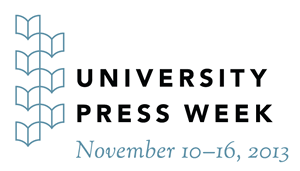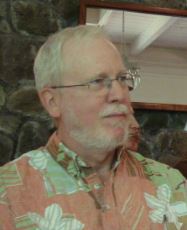 To celebrate University Press Week, November 10–16, three dozen Association of American University Presses are offering a blog tour every day this week. Today’s theme is Meet the Press, featuring blog profiles of employees at the following presses: McGill-Queen’s, Penn State, Illinois, Missouri, Colorado, Florida, and Hawai‘i (immediately below).
To celebrate University Press Week, November 10–16, three dozen Association of American University Presses are offering a blog tour every day this week. Today’s theme is Meet the Press, featuring blog profiles of employees at the following presses: McGill-Queen’s, Penn State, Illinois, Missouri, Colorado, Florida, and Hawai‘i (immediately below).
Soon-to-retire UH Press Journals Manager Joel Bradshaw is a man with too many hometowns and an incurable travel bug. The son of missionaries to Japan, he first visited Hawai‘i as a toddler aboard the SS President Cleveland in 1950. He counts his first Japanese hometown as Kyoto, where he spent his elementary-school years, and his first American hometown as Winchester, VA (his mother’s hometown), where he attended junior high school. But he also claims Kobe, where he went to high school at Canadian Academy, and Hiroshima, where he spent holidays and summers at home.
Returning to the U.S. for college was like traveling to a foreign country, even though he spoke the language well enough to pass for a native. His uncle put him to work in his small-town service station, where he changed many a car, truck, and tractor tire between semesters at the University of Richmond, VA (his father’s alma mater). After dropping out of college in delayed culture shock, he found himself having to negotiate with Army recruiters, who agreed to send him to language school for Romanian—7th on his preferred list of 8, which began with Japanese, Korean, Chinese, and Russian. At least it assured him a very pleasant nine months at the Defense Language Institute in Monterey, CA, two years stateside as a company clerk in Augusta, GA, and enough GI Bill money to carry him well into graduate school.
He arrived in Hawai‘i the day he got out of the Army in 1972 because it was as close as he could get to Japan. But graduate school in linguistics at the University of Hawai‘i at Mānoa (UHM) took him in other directions, sending him to Micronesia, where he first met his future wife (the Peace Corps girl next door), and then sending him farther afield to Papua New Guinea to document Numbami, an Austronesian language spoken by only a few hundred speakers—and by even fewer nowadays. His eventual Ph.D. gave him the chance to spend a grimly fascinating Fulbright postdoc year in Romania in 1983–84, but it never led to full-time academic employment.

Joel’s experience in academic publishing began during graduate school in the late 1970s. To make ends meet after his research assistantships and his GI Bill allotment had both run out, he took on freelance and part-time work as a proofreader, copyeditor, and typesetter on a wide variety of projects, mostly for UH Press and the East-West Center. Among his more memorable tasks were: reading aloud every punctuation mark and change of type, and spelling out many Latin binomials and anatomical terms while double-proofing issues of the journal Pacific Science; tediously justifying columns of text line-by-line on an IBM compositor; and typing on a teleprinter that generated 5-bit Baudot-coded paper tape to feed into a hot-metal Monotype machine. Such entry-level print production experience eventually led to full-time jobs downtown, doing computer support work for an accounting firm and then a bank. His first personal computer was an Osborne 1.
During the 1990s, his old department chair enticed him back onto campus and recommended him for full-time work as a publications specialist at the UH Center for Korean Studies. Once back on campus, Joel also began publishing more of his own research and reviewing books for Oceanic Linguistics, while occasionally being called upon for peer-review duties. He learned a lot more about the editorial side of academic publishing.
In 1998, he joined UH Press as journals manager. It was in many ways a perfect match for his odd assortment of interests and experience. He had already worked for several of the UHP journals, and UHP’s many books on Asia and the Pacific led him to take frequent advantage of his employee discount. His accounting experience helped make sense of journal finances, and his database experience in banking helped him convert the first UH Press website from hand-crafted pages to a database-driven e-commerce site. He even became a UH Press author by cotranslating Dempwolff’s Grammar of the Jabêm Language in New Guinea (with the crucial help of a friend in Romania far more fluent in German).
In retirement, he plans to continue documenting Numbami for its few remaining speakers as well as for fellow linguists, and also to complete a second, somewhat less obscure book for UH Press about the early 20th-century history of urban Honolulu, his longest-lasting hometown.





